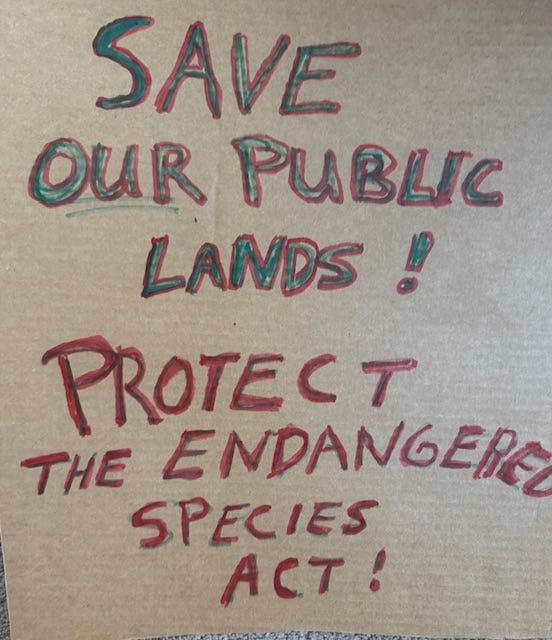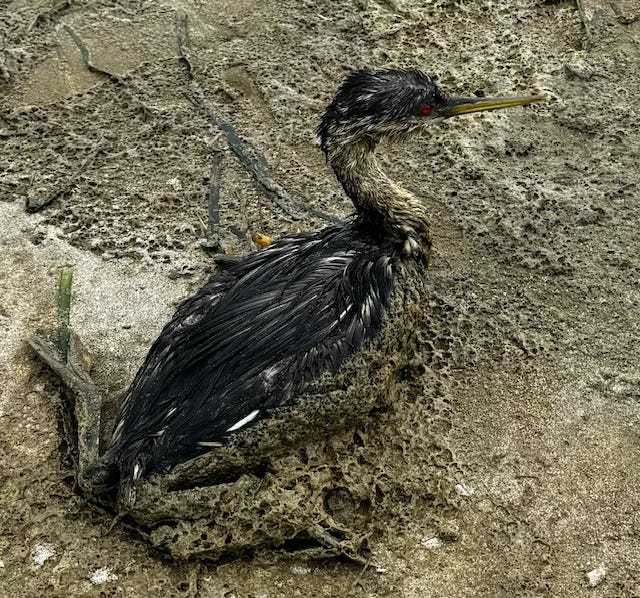Here's how we save the Endangered Species Act
Appeal to the human desire to rescue individual animals and birds in trouble
Have you ever scooped up a baby bird that fell out of a nest? Maybe you’ve volunteered at a wildlife rescue or rehabilitation center. We’ve likely all read stories of people trying to save the life of a beached whale and giving tirelessly to rescue birds covered in oil after yet another deadly spill. And for some readers, you are those people. Thank you.
I believe we are hard-wired to care about individual wild animals, but generally lousy at caring about whole populations and the habitats they rely on for survival—habitats that are tied to the survival of people, too. It’s time to tap into what we’re good at to save the whole. I have some ideas.
As the Trump Administration goes forward with a wicked plot to decimate wildlife and habitats protected under the wildly popular Endangered Species Act, the time to act is now. Trump and his billionaire cronies are dead set on changing the definition of “harm” under the ESA to say destroying the habitat is not harm .
That could be a death sentence for our rarest wildlife and for thousands of kinds of wildlife and plants reliant on old-growth forests, wildflower native prairies, unpolluted waters, and more.
Basically, the sneaky “revision” is one more way to decimate the nature of America for short-term profit and the demise of all we hold dear. Extinction is forever. There is no recovery.
Before I go further, DO TAKE ACTION BY MAY 19TH! See this alert from the Center for Biological Diversity. And even if you are just filling out the form, take two minutes to do it. Thanks.
“By changing the meaning of a single word, the Trump administration could gut habitat protections for all endangered species. “—- Center for Biological Diversity.
(That’s my sign I held up for the May 5th rally in Bend, Oregon. If I had time to make something better I would have put up photos of birds and animals!)
But how do we activate far more people to stand up, protest, and care? How do we put this horrendous proposal at the top of lists of onslaughts to stop?
My idea is to appeal to people’s love of individual animals, even domestic pets. (As I write this, my black labrador Pepper is curled around my feet as she dens under my desk. I love her so much).
The good news is that people really do love animals—and the more adorable they are, the better. They become the ambassadors for what E.O. Wilson famously called “the little things that run the world” —like ants, bees, spiders, and mites.
When speaking up, writing, and enlisting other supporters, find and share superlative stories of individual animals, like the Blandings Turtle living in a Michigan forest reserve at age 83 or a wolverine called Stormy roaming Oregon’s high Wallowas for more than a decade looking for a mate. And yes—giving individual wild animals names is a good thing! It’s part of how we care and get others to care. When I wrote my book on kingfishers, I named the pair I watched the first season.
Think of your own stories of naming, care, and rescue. I hope they help strengthen your commitment to defending the Endangered Species Act’s integrity and give you more tools for activism.
I used to write blogs for National Wildlife to help pass the Recovering America’s Wildlife Act, a long-term effort that came close during the Biden administration, but sadly did not pass—yet. We aren’t giving up. In most of them, I did take the individual tact for wildlife in the spirit of journalism about one person or family to lead into the big story of a war or other crisis.
For example, I began my blog on the need to save the Southern Sea Otter this way:
“A sea otter cub sleeps in the embrace of its mother. The rocking waves in the kelp bed and the mother’s constant grooming are soothing. Above them on California’s coastal cliffs, visitors gather to watch sea otters that had all but vanished less than a century ago.”
When I wrote about salamanders for National Wildlife, again I started with a scene of one salamander. We all are drawn into stories and what happens next:
“On a rainy spring night in a New Jersey forest, a Jefferson salamander stirs under the rotting log that hides her. At last, it’s time. She wriggles slowly through the fallen leaves for her half-mile journey to the same pond where she was born. It’s a vernal pool, meaning it fills with water only part of the year, from late fall into summer.
The shiny gray salamander skirts a tiny pond and pops out from the forest into mortal danger—a road. She crawls forward. Halfway across, a car speeds toward her. The wheels just miss her. She keeps going, determined to reach her pond. No other one will do. On this night, other Jefferson salamanders are on the move as well, along with wood frogs, spotted salamanders, spring peepers and American toads. All depend on reaching vernal pools.”
I’ll end with this handsome Western Grebe I helped rescue last fall after the poor bird washed up in heavy surf on an Oregon beach at Cape Lookout State Park. The female was so covered in sand and bedraggled that I mistook her for a juvenile. I wrote about my experience and gratitude to the Wildlife Center of the North Coast in Astoria here.
When I published that piece I had not yet seen the photo above or heard the happy ending. Volunteers drove two hours south back to Cape Lookout State Park with the fully recovered Western Grebe to gently release her in the saltwater bay, a much safer place than the ocean for a grebe. There, she could rejoin other grebes. I like to think of her with family and kin and this time of year performing courtship dances on the water.
Save a grebe. Save the ocean. Save the Endangered Species Act. And here’s one more tip. We need far more happy endings. I’m not saying sugarcoat what’s terrible, but do keep putting forward a positive vision. I know I have to find ways to lift my spirits and not give into despair.
Please share your animal rescue stories in comments. Thank you for stepping up to save the Endangered Species Act! We all need habitat. Pepper is still under the desk at my feet. She is lucky to have a safe home and good life. I want that for all her canine kin, especially endangered gray wolves.
And have you heard the story of the wolf named Journey? The lone male wolf trekked across Oregon’s wildest places from northeastern Oregon and down into northern California—a journey that mapped what we must protect through keeping our Endangered Species Act strong and protecting our public lands from Trump orders to accelerate logging, mining, and grazing while ignoring environmental laws. That’s critical to act on, too. And when you act, please tell your stories of what matters most to you. Make it personal. Don’t be afraid of the word love.
Thank you.
Here is what the poor grebe looked like when I first saw her. Did I help save the marine ecosystem? No, but I took a step and am doing my best to connect that one act to saving the whole. Our living breathing planet in distress needs us like never before.









Agree. This has been one of the most powerful laws to promote conservation in the US. ESA is another of the many key laws passed with a bipartisan majority back in the days of the Nixon administration. It is not without controversy, and could be made more effective, and less costly to land owners. But obviously the key provision is habitat protection, which is why many species go extinct. One of the great challenges is that the best time to conserve wildlife is before they become threatened or endangered. Small changes in habitat protection can make a big difference at that point. But there are few legal or economic incentives for land managers to do this, before species come under the protection of the ESA. It would cost a lot less money and be less disruptive to save species before they are threatened. I always thought what we really need is ecosystem protection not just protection for a few well documented threatened species. But ESA has made a huge difference, and many species have been saved from extinction mostly because of the enforcement this important law. I hope this destructive change and gutting of the law does not go through.
When I clicked on the sign "thing" it came up blank? I've rescued baby squirrels (2 died) that went to Sweetbriar Nature Preserve here on L.I., NY. I brought home a wounded grail I found out running years ago in Astoria. The vet, a bird man, couldn't save her, but I wasn't going to leave her there. And he only charged me $25.00 that he donated to a wildlife rescue (what a man! I'm afraid I don't know such vets these days; they're all money maniacs). I got my Greek husband in on a rescue of a chicken that had been dumped at Sunken Meadow Park & was freezing to death. He actually thought to use a rope (which was ridiculous & didn't work). During the rescue a Scotsman (of all things) happened upon us and laughed. Finally, I convinced my husband that we needed a blanket which worked. I took it to a local farm that sold eggs & I have the awful suspicion that he began "dinner" as he wasn't a special chicken like the ones they had on display. I stopped going to them years ago as I realized they didn't take care of the caged birds - too many in a tiny enclosure etc... I don't mention the dogs, cats & men(I was a wild child in Nola growing up) I rescued🕶️ Thank you for all you do, Marina💕🐇🐂🐿️🕊️